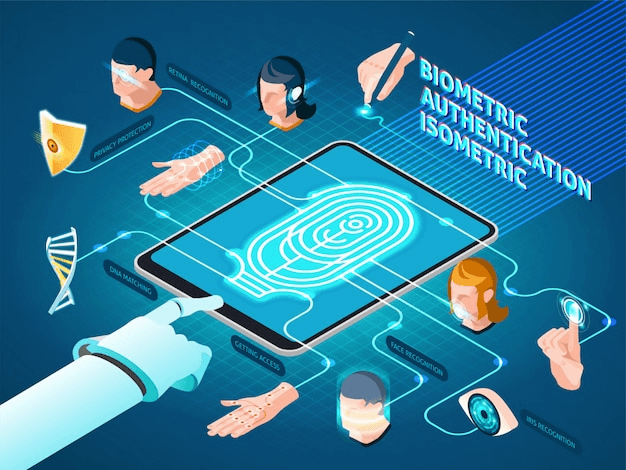Biometric sensors are revolutionizing the era where technological progress is accelerating at record-breaking pace, the need for secure authentication methodologies is more crucial than ever.traditional security measures like passwords and PINs are becoming out of date, and giving rise to more advanced, user friendly and secure alternatives. A revolutionary advancement is biometric sensors, which swiftly reshape how we interact with our devices, secure our sensitive data, and access various organizations. From intuitive finger authentication to facial and iris scanning, biometric sensors offer supreme security and ease of use, making them the future of authentication.
Understanding Biometric Sensors
A biometric sensor is a device that captures and analyzes one of a kind organic characteristics to confirm an individual’s character. Not at all like routine confirmation strategies that depend on something you know (passwords) or something you have (cards), biometric sensors depend on physical or behavioral characteristics. These incorporate fingerprints, facial highlights, iris patterns, voice acknowledgment, and even pulse rhythms. Since these characteristics are nearly impossible to duplicate or counterfeit, biometric sensor innovation gives a higher level of security compared to conventional strategies. For an in-depth understanding of biometric sensor innovation and its applications, you can refer to trusted assets such as Biometric Update, a driving source for biometric industry news and research.
Enhancing Security With Biometric Sensors
One of the essential preferences of biometric sensor innovation is its capacity to upgrade security. Passwords can be stolen, and PINs can be speculated, but biometric information is interesting to each person. This makes it amazingly troublesome for unauthorized clients to pick up sensitive data or confined zones. Numerous businesses, counting keeping money, healthcare, and government teaching, are progressively receiving biometric sensor frameworks to fortify their security measures.
Moreover, biometric verification altogether decreases the risk of identity theft. Since a biometric sensor peruses and confirms live natural highlights, fraudsters cannot utilize stolen accreditations to imitate somebody else. This is especially advantageous in budgetary exchanges, where biometric verification guarantees that as it were the legitimate proprietor can get to their accounts.

Convenience Beyond Passwords and PINs
Beyond security, biometric sensor innovation is revolutionizing ease.With a basic touch or look, clients can open their smartphones, get to online services, and indeed make installments. The bother of recalling complex passwords or carrying numerous security tokens is dispensed with. This consistent encounter is why businesses are coordinating these sensors, frameworks into their administrations to improve client satisfaction.
For example, smartphones with biometric sensors permit clients to open their devices immediately with a unique mark or facial acknowledgment. Airplane terminals and border control organizations utilize biometric verification to streamline traveler preparing, lessening long hold up times. Additionally,workplaces actualize biometric passage frameworks to guarantee as if authorized faculty can get to confined zones without the requirement for keys or get to cards.
The Role of Biometric Sensors in Financial Transactions
The financial sector is one of the greatest recipients of biometric sensor innovation. Banks and fintech companies are executing biometric confirmation for online managing an account, ATM withdrawals, and versatile installments. Instead of entering a PIN, customers can confirm their personality through a unique finger impression or facial recognition, making transactions both secure and efficient. Digital installment stages such as Apple Pay and Google Pay utilize biometric sensors to authorize installments, decreasing the chance of extortion. With the expanding selection of biometric confirmation in financial services, the future of cashless and password-free exchanges looks promising. Concurring to a report by Juniper Research, biometric verification will be used in over 1.4 billion exchanges yearly by 2025.
Biometric Sensors in Healthcare and Wearable Technology
The healthcare providers are turning to biometric sensor technology to enhance patient safety, securing medical records and allowing efficient check-ins. Biometric identification in hospitals protects patient data from unauthorized access, ensuring confidentiality and regulatory compliance. Wearable Devices, such as smartwatches and wellness trackers, with biometric sensors to keep record of heart rate, oxygen levels, and stress patterns. These sensors give real-time health insights, empowering users to track their well-being easily.
Challenges and Future Prospects of Biometric Sensors
Despite their advantages, they raise critical concerns around data protection and user privacy as the sensitivity and private nature of biometric data makes it a high risk target for security breaches. Unlike passwords, which can be changed if spilled, biometric characteristics cannot be modified. To address this, companies are embracing encryption and secure capacity arrangements to secure biometric information from cyber threats.
Another challenge is ensuring precision and unwavering quality. Natural components, lighting conditions, and sensor quality can affect the execution of biometric sensors. However continuous progressions in AI and machine learning are making a difference, moving forward precision and decreasing positives or negatives.
Looking ahead, the integration of multi-modal biometrics combining unique finger impression, facial, and voice recognition will improve verification unwavering quality. Moreover, AI-driven biometric security frameworks will move forward with extortion discovery and real-time threat analysis. As more businesses grasp biometric confirmation, it will soon become the standard for secure and easy distinguishing proof.

The password and PIN is coming to an end as biometric sensor technology emerges, offering enhanced security, seamless and secure experience and becoming a vital part of our digital existence. From securing smartphones to empowering dependable money related exchanges and redesigning healthcare courses of activity, biometric sensors are forming the future of security and reassurance. As the progression advances, we can anticipate without a doubt more advanced applications that will make standard intuitively more secure and smoother for people and businesses alike.




